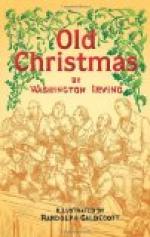The parson said grace, which was not a short, familiar one, such as is commonly addressed to the Deity, in these unceremonious days; but a long, courtly, well-worded one of the ancient school.
There was now a pause, as if something was expected; when suddenly the butler entered the hall with some degree of bustle; he was attended by a servant on each side with a large wax-light, and bore a silver dish, on which was an enormous pig’s head, decorated with rosemary, with a lemon in its mouth, which was placed with great formality at the head of the table. The moment this pageant made its appearance, the harper struck up a flourish; at the conclusion of which the young Oxonian, on receiving a hint from the Squire, gave, with an air of the most comic gravity, an old carol, the first verse of which was as follows:
“Caput apri defero
Reddens laudes Domino.
The boar’s head in hand bring I,
With garlands gay and rosemary.
I pray you all synge merily
Qui estis in convivio.”
Though prepared to witness many of these little eccentricities, from being apprised of the peculiar hobby of mine host; yet, I confess, the parade with which so odd a dish was introduced somewhat perplexed me, until I gathered from the conversation of the Squire and the parson that it was meant to represent the bringing in of the boar’s head: a dish formerly served up with much ceremony, and the sound of minstrelsy and song, at great tables on Christmas Day. “I like the old custom,” said the Squire, “not merely because it is stately and pleasing in itself, but because it was observed at the College of Oxford, at which I was educated. When I hear the old song chanted, it brings to mind the time when I was young and gamesome—and the noble old college-hall—and my fellow students loitering about in their black gowns; many of whom, poor lads, are now in their graves!”
The parson, however, whose mind was not haunted by such associations, and who was always more taken up with the text than the sentiment, objected to the Oxonian’s version of the carol: which he affirmed was different from that sung at college. He went on, with the dry perseverance of a commentator, to give the college reading, accompanied by sundry annotations: addressing himself at first to the company at large; but finding their attention gradually diverted to other talk, and other objects, he lowered his tone as his number of auditors diminished, until he concluded his remarks, in an under voice, to a fat-headed old gentleman next him, who was silently engaged in the discussion of a huge plateful of turkey.*
[5] See Note E.
The table was literally loaded with good cheer, and presented an epitome of country abundance, in this season of overflowing larders. A distinguished post was allotted to “ancient sirloin,” as mine host termed it; being, as he added, “the standard of old English hospitality, and a joint of goodly presence, and full of expectation.”




